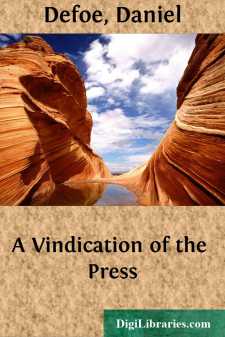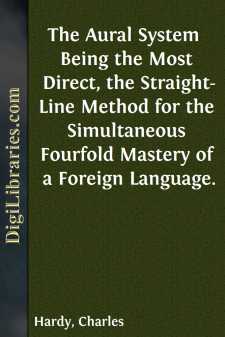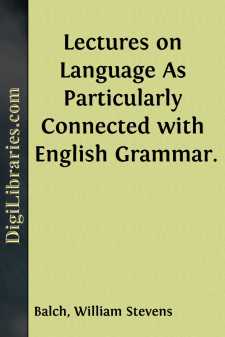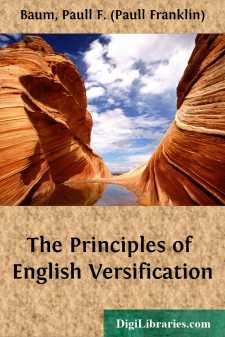Language Arts & Disciplines
Language Arts & Disciplines Books
Sort by:
by:
Daniel Defoe
INTRODUCTION A Vindication of the Press is one of Defoe's most characteristic pamphlets and for this reason as well as for its rarity deserves reprinting. Besides the New York Public Library copy, here reproduced, I know of but one copy, which is in the Indiana University Library. Neither the Bodleian nor the British Museum has a copy. Like many items in the Defoe canon, this tract must be...
more...
Introductory The appended to this volume is (with the exception of the red lines and red lettering upon it) a reproduction of a portion of the map relating to the explorations and surveys of Dr. Strong, Mr. Monckton and Captain Barton, which was published in theGeographical Journalfor September, 1908, and the use of which has been kindly permitted me by the Royal Geographical Society. I have eliminated...
more...
I. THE TEACHING OF THE NOVEL All will agree that the novel is one of the most important forms of literature for high school study. The fact that almost every boy and girl who is at all interested in reading likes the novel, gives the teacher an excellent opportunity to stimulate the pupil's love for literature and to help him to discriminate between what is true and what is false; between what is...
more...
by:
Charles Hardy
Some time ago, a Mr. Wm. Rodger came down from Glasgow for the purpose of showing how foreign languages should be taught. He brought on a gentleman, a clergyman from Leeds, who had gone through Otto’s German Grammar without being able either to speak or understand German; this gentleman was able to bear testimony to the merit of Mr. Rodger’s system because by it he had learnt to do both. Of...
more...
LECTURE I. GENERAL VIEW OF LANGUAGE. Study of Language long considered difficult. — Its importance. — Errors in teaching. — Not understood by Teachers. — Attachment to old systems. — Improvement preferable. — The subject important. — Its advantages. — Principles laid down. — Orthography. — Etymology. — Syntax. — Prosody. Ladies and Gentlemen, It is proposed to commence, this...
more...
PREFACE Most of the older discussions of English versification labored under two difficulties: an undue adherence to the traditions of Greek and Latin prosody more or less perfectly understood, and an exaggerated formalism. But recently the interest and excitement (now happily abated) over free-verse have reopened the old questions and let in upon them not a little light. Even today, however, a great...
more...
CHAPTER I. THE COLONIES. HISTORY AND LOCATION. THE FIRST SETTLERS. The first reference to German settlers in Brazil we have from the pen of Hans Stade of Homberg in Hessen. Stade made two trips to Brazil; one in 1547 and one in 1549. In the latter instance he was shipwrecked but succeeded in landing safely near the present port of Santos in the state of São Paulo. As he was a skilled artillerist the...
more...
by:
James Mooney
INTRODUCTION. The sacred formulas here given are selected from a collection of about six hundred, obtained on the Cherokee reservation in North Carolina in 1887 and 1888, and covering every subject pertaining to the daily life and thought of the Indian, including medicine, love, hunting, fishing, war, self-protection, destruction of enemies, witchcraft, the crops, the council, the ball play, etc., and,...
more...
I. ORIGIN OF THE WORK. About a generation ago Mr. Matthew Arnold twitted our nation with the fact that "the journeyman work of literature" was much better done in France—the books of reference, the biographical dictionaries, and the translations from the classics. He did not especially mention dictionaries of the language, because he was speaking in praise of academies, and, as far as France...
more...
by:
Alfred Ayres
PREFATORY NOTE. The title-page sufficiently sets forth the end this little book is intended to serve. For convenience' sake I have arranged in alphabetical order the subjects treated of, and for economy's sake I have kept in mind that "he that uses many words for the explaining of any subject doth, like the cuttle-fish, hide himself in his own ink." The curious inquirer who sets...
more...











